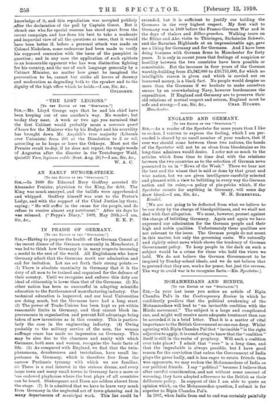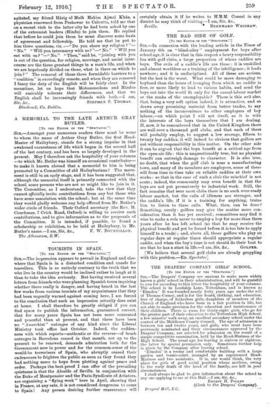MOHAMMEDANS AND HINDUS.
[To THE EDITOR OP THE " SPECTATOR.”1 Sne,—In your last issue you notice an article of Bipin Chandra Pal's in the Contemporary Review in which he confidently predicts that the political awakening of the Mohammedans will lead to " an invincible coalition with the Hindu movement." The subject is a large and complicated one, and might well receive more adequate treatment than can be accorded it in a brief letter. That it is a matter of vital importance to the British Government no one can deny. Whilst agreeing with Bipin Chandra Pal that " invincible " is the right adjective to apply, it is comforting to know that the "coalition " itself is still in the realm of prophecy. Will such a coalition ever take place ? I admit that " ever " is a long time, and that the improbable is always possible, but I have good reason for the conviction that unless the Government of India plays the game badly, and is less eager to retain friends than woo opponents, we may reckon the Mohammedans of India as our political friends. I say " political " because I believe that after careful consideration, and not without some amount of wavering, they have adopted adherence to the British as their deliberate policy. In support of this I am able to quote an opinion which, on the Mohammedan question, I submit is far superior to Bipin Chandra Pal's.
In 1907, when India from end to end was certainly painfully
agitated, my friend Htizig ul Mulk Hakim Ajmal Klan, a physician renowned from Peshawar to Calcutta, told me that on a recent visit to the latter city he had been asked by one of the extremist leaders (Hindu) to join them. He replied that before he could join them he must discover some basis of agreement and fellowship. He told me that he put to him three questions, viz. :—" Do you share my religion ? "- " No." " Will you intermarry with us ?"—" No." "Will you
at with us P "—" No." " Then," said he, " joining with you is out of the question, for religion, marriage, and social inter- course are the three greatest things in a man's life, and when we are hopelessly divided on these, what is there on which to join ? " The removal of these three formidable barriers to a "coalition" is exceedingly remote, and when they are removed I fancy the duty of the English will be fairly clear. In the meantime, let us hope that Mohammedans and Hindus will amicably tolerate their differences, and that we English shall be increasingly friends with both.—I am,











































 Previous page
Previous page